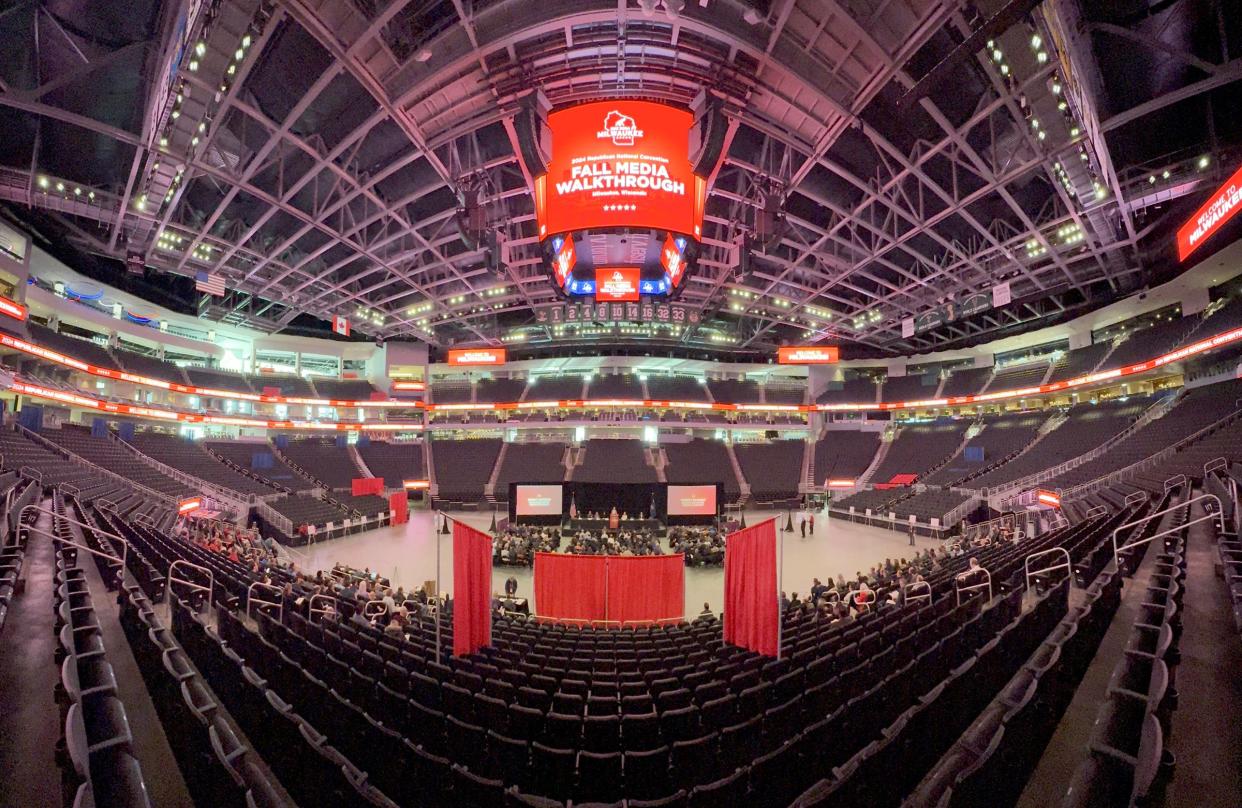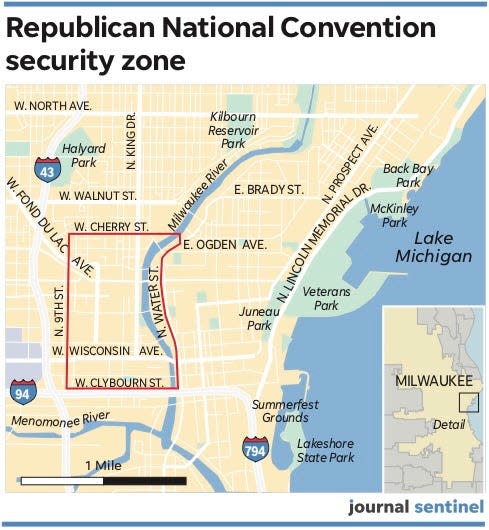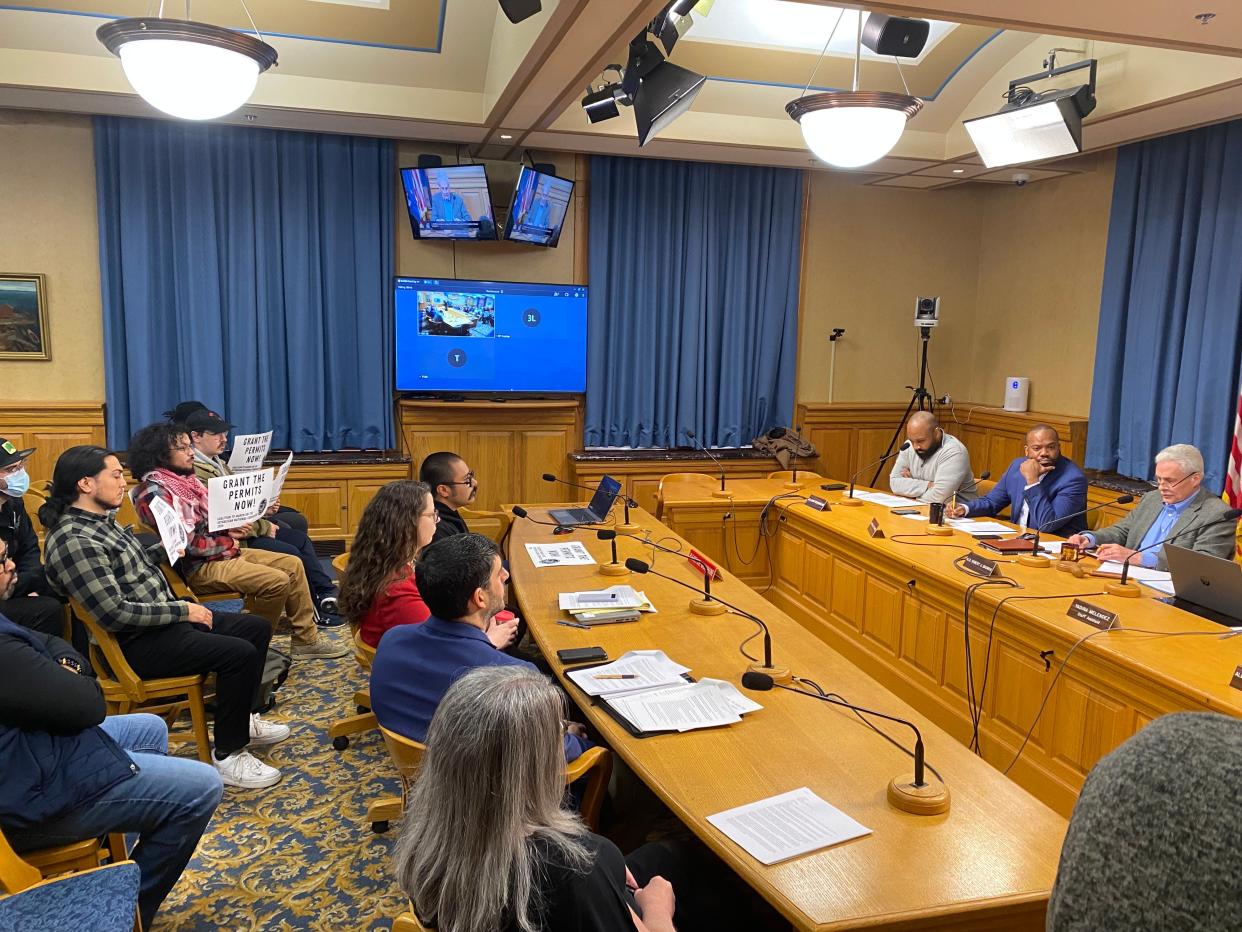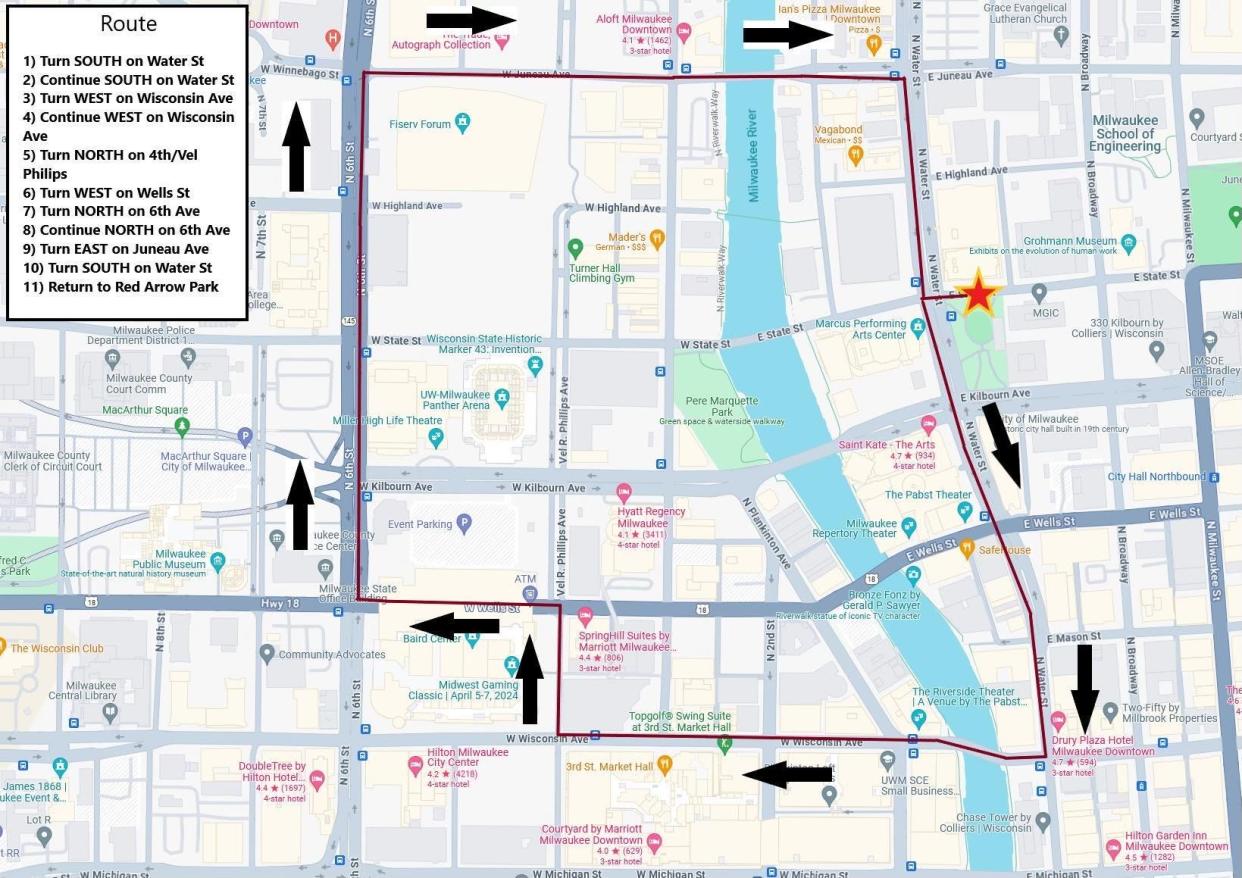3 months from the RNC in Milwaukee, rules for demonstrating are a hot debate
An ordinance laying out demonstration rules during this summer's Republican National Convention is in place, passed by the Common Council and signed by Mayor Cavalier Johnson last month.
But that doesn't mean the debate is over.
Instead, the city is engaged in discussions with local activists about a range of concerns and questions they've voiced as the countdown to the event drops below 90 days. They've argued the ordinance creates a liability for protest organizers, and they're questioning everything from whether police from agencies outside Milwaukee will be required to wear body cameras to where anyone who is arrested will be taken.
But in a recent meeting on the city's south side, they also raised a more fundamental question: How, or if, their comments will make any difference as the city barrels toward the July 15-18 event.
Ashanti Hamilton, director of Milwaukee's Office of Community Wellness and Safety, said the answer is yes.
He acknowledged there's much to do in the remaining months before the massive event arrives downtown, bringing with it tens of thousands of visitors and thousands of police officers from outside the city. Hamilton said local organizers' input would be included.
"We should know from historical relationships with many protest groups that the city should not have any interest in smothering voices. These voices should be heard, they should be welcomed, and we should find a way of making that easy," said Hamilton, whose office is leading the discussions with activists.
Still, one of the lead organizers of the Coalition to March on the RNC 2024 remains unconvinced that the city will make the changes they're seeking.
The convention is on track to become a showcase for the likely Republican nominee Donald Trump, a polarizing figure who could be expected to attract both vocal opponents and loyal supporters of the former president outside the downtown event venues. Elected city officials have raised concerns about who might come, including raising the specter of the Jan. 6, 2021, attack on the U.S. Capitol after Trump lost the 2020 election.

Activists concerned about RNC demonstration ordinance
On a warm April evening, more than 30 people from about a dozen organizations gathered at Tippecanoe Library on the city's south side to pose questions and concerns to city officials about the upcoming convention.
There are three key changes Coalition to March on the RNC 2024 organizers would like, but whether they'll come to pass remains to be seen.
In a press conference before the meeting, coalition Co-Chair Omar Flores called for the repeal of the ordinance laying out rules for the yet-to-be-announced demonstration locations within the security zone, the reinstatement of a 15-day video release policy for police shootings that is suspended during the convention, and the ability to protest closer to the convention venues than is currently expected.

The RNC framework agreement to which city leaders signed on in 2022 requires the city to provide security for a demonstration area and "parade route" in addition to scheduling and issuing any required permits for the demonstration area.
But Flores said language in the ordinance and included in the permit application to hold demonstrations during the RNC creates a potential liability for organizers.
The language requires those seeking a permit to say whether the requester or any person in the group or organization "previously engaged in violent or destructive conduct in connection with a previous parade or other public assembly, in violation of any provisions of the Milwaukee Code of Ordinances or any state or federal laws."
The language was pulled into the permit application directly from the "extraordinary event" ordinance, which was broadened in response to concerns by Common Council members about the power of the ordinance to preclude participation by known hate groups that attend events to foment violence.

"Of course, they can say what they want, but it's what follows that," Ald. Lamont Westmoreland said of those groups in the early March meeting at which the Jan. 6 attack was referenced.
Flores has contended that requiring the person applying for the permit to check a box attesting to the past behavior of every person who may participate in a demonstration creates a potential liability for organizers. He pointed to the lower court ruling that the U.S. Supreme Court let stand Monday that found a Black Lives Matter protest organizer could be sued by a police officer who was injured by an unknown person.
Westmoreland told the Journal Sentinel the question is fair and said Johnson's administration had not engaged in enough conversations with council members and the community before the ordinance went up for a vote.
"It was like a shove-it-down-your-throat move, and ... I don't like anything shoved down my throat because then you start choking," he said, referencing the unanswered questions that remain.
As to whether he'd be open to changing the ordinance, Westmoreland said he would defer to the committee chairperson who will be selected now that the new council term has begun.
Johnson contended that his administration followed best practices to make sure people could demonstrate at the convention, regardless of their message. He said it was his responsibility to ensure a safe convention for all involved, and his administration was doing its due diligence on that front.
"We worked with the council to the degree that we were able to do," he said. "Ultimately, they voted on it and passed it, and we appreciate that and that's what we're moving forward with."
He said he did not see a need to reconsider the language in the ordinance.
Members of Johnson's administration and the City Attorney's Office who presented the ordinance to the council's Public Works Committee expressed a sense of urgency to pass it and thereby open the permit application process to avoid a potential lawsuit.
What constitutes protesting within 'sight and sound' of the RNC?
How close demonstrators will be allowed to get to the inner, secure perimeter that will surround the convention venues is also at issue.
The city has not released the route demonstrators will be allowed to march or the location of a speaker's platform, though in the early March meeting, Johnson's Chief of Staff Nick DeSiato told the committee that Pere Marquette Park would be a "likely candidate" for the speaker's platform.
City officials have said that the locations will be within "sight and sound" of the downtown venues where the convention will be held and inside the wider security zone that surrounds them. That zone stretches from Cherry Street to the north to West Clybourn Street on the south and from North Water Street on the east to North 9th Street to the west.
However, Flores contended they won't be allowed close enough to be heard by convention attendees. That would be the case even if the speaker's platform were in Pere Marquette Park, 900 N. Plankinton Ave., which was the designated protest area for the 2020 Democratic National Convention, he said.
The coalition is also pushing for a demonstration march route that would travel up Sixth Street right next to the three convention venues of the Fiserv Forum, Baird Center and UW-Milwaukee Panther Arena. That route would also take them up Vel. R. Phillips Avenue from West Wisconsin and through the tunnel where the Baird Center spans West Wells Street.
"I don’t want to speculate as to where the Secret Service is going to establish what’s called the 'hard zone,' but the parade routes that are possible will be affected by the Secret Service considerations," Mayor's Office spokesman Jeff Fleming said.

Office of Community Wellness and Safety hopes to incorporate feedback into Republican National Convention planning
What impact the conversations taking place today will ultimately have on the RNC is still in development between the Office of Community Wellness and Safety (formerly known as the Office of Violence Prevention) and organizers, Hamilton said.
"I would be very definitive in saying that how this looks and the level of responsibility that (organizers) would want to have is in a large part up to them to develop in this process," Hamilton said. "We want to help facilitate that."
The next step, he said, is to put together a group of organizers and community members that can start to shape how their influence would be felt when the RNC is in town. He envisioned this group serving as an advisory committee to Johnson's RNC Executive Steering Committee.
He hoped by the next meeting with organizers in early May to have identified people willing to participate in the panel.
Still, Flores remained skeptical of the utility and intent of such a committee, saying he did not feel the city was operating in good faith.
The meetings, he said, have been helpful in terms of information gathering.
At the Tippecanoe Library, Hamilton read written answers from Milwaukee police to a dozen questions that had been previously raised, and city officials took down additional questions that they could not answer in the moment.
A third is scheduled for early May.
Alison Dirr can be reached at adirr@jrn.com.
This article originally appeared on Milwaukee Journal Sentinel: Protest groups seek changes to RNC demonstration rules
